Importance of Communication in Healthcare: A Detailed Report
VerifiedAdded on 2023/06/04
|7
|1123
|212
Report
AI Summary
This healthcare report delves into the critical role of communication within health and social care settings, emphasizing its significance in fostering strong patient-provider relationships and ensuring effective information exchange. It highlights Michael Argyle's communication cycle, underscoring the importance of both verbal and non-verbal communication methods. The report elaborates on how proficient communication skills enhance teamwork, promote clarity among healthcare professionals, and ultimately contribute to superior patient care. It further discusses how verbal communication facilitates accurate medical histories and effective managerial roles, while non-verbal cues build emotionally supportive relationships. The report concludes by advocating for continuous training in communication skills within healthcare institutions to improve patient satisfaction and build trust, suggesting the implementation of patient satisfaction surveys to identify areas for enhancement. Desklib provides access to this and many other solved assignments for students.
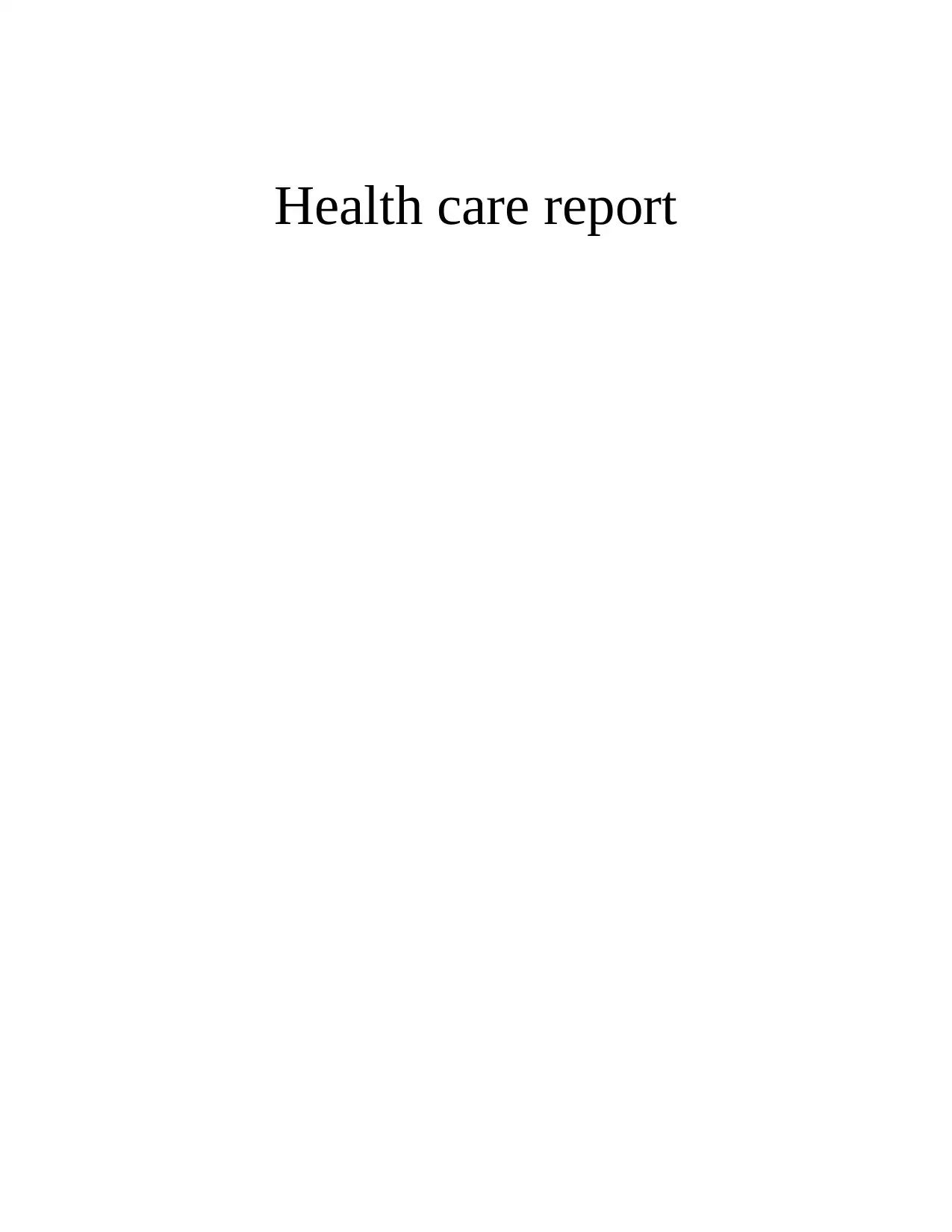
Health care report
Paraphrase This Document
Need a fresh take? Get an instant paraphrase of this document with our AI Paraphraser
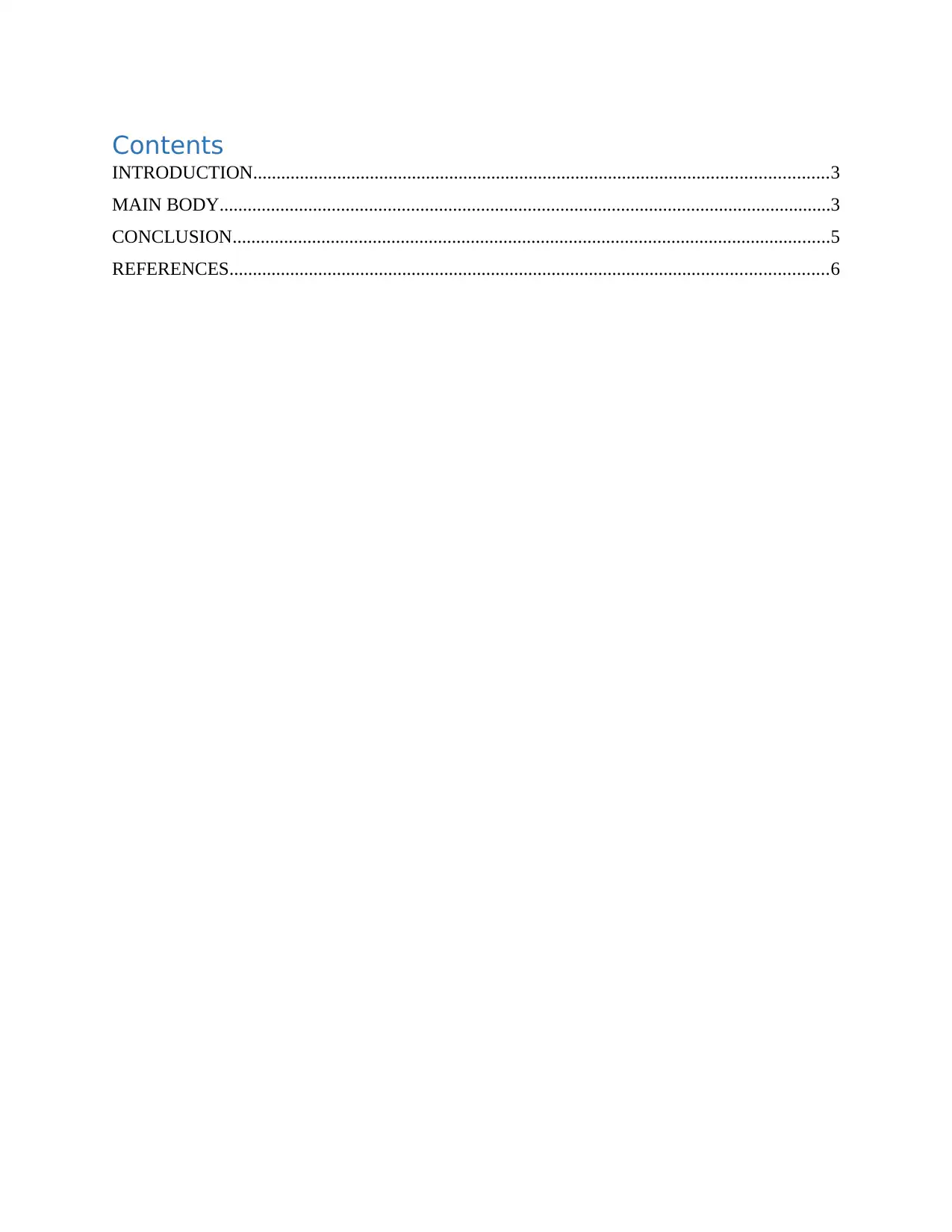
Contents
INTRODUCTION...........................................................................................................................3
MAIN BODY...................................................................................................................................3
CONCLUSION................................................................................................................................5
REFERENCES................................................................................................................................6
INTRODUCTION...........................................................................................................................3
MAIN BODY...................................................................................................................................3
CONCLUSION................................................................................................................................5
REFERENCES................................................................................................................................6

⊘ This is a preview!⊘
Do you want full access?
Subscribe today to unlock all pages.

Trusted by 1+ million students worldwide
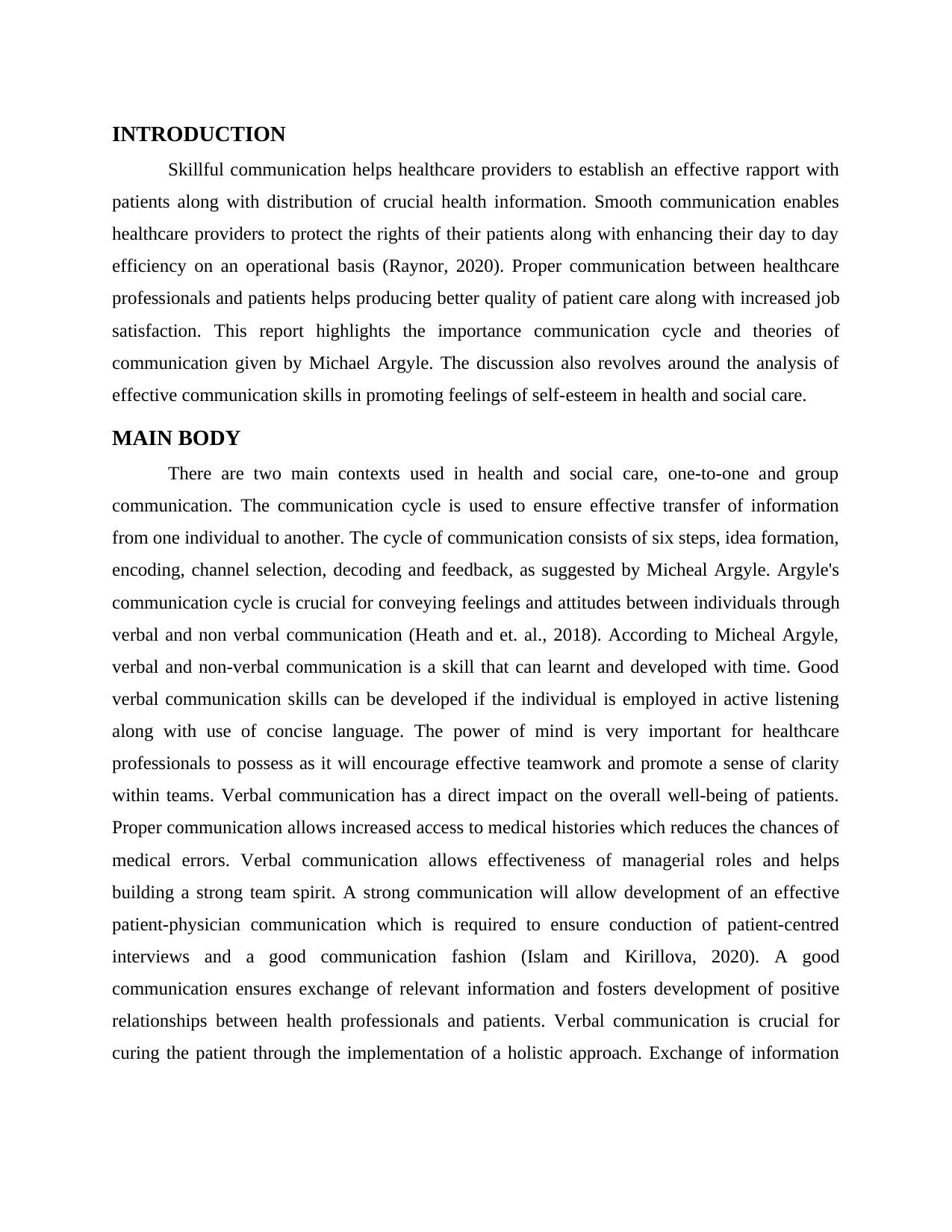
INTRODUCTION
Skillful communication helps healthcare providers to establish an effective rapport with
patients along with distribution of crucial health information. Smooth communication enables
healthcare providers to protect the rights of their patients along with enhancing their day to day
efficiency on an operational basis (Raynor, 2020). Proper communication between healthcare
professionals and patients helps producing better quality of patient care along with increased job
satisfaction. This report highlights the importance communication cycle and theories of
communication given by Michael Argyle. The discussion also revolves around the analysis of
effective communication skills in promoting feelings of self-esteem in health and social care.
MAIN BODY
There are two main contexts used in health and social care, one-to-one and group
communication. The communication cycle is used to ensure effective transfer of information
from one individual to another. The cycle of communication consists of six steps, idea formation,
encoding, channel selection, decoding and feedback, as suggested by Micheal Argyle. Argyle's
communication cycle is crucial for conveying feelings and attitudes between individuals through
verbal and non verbal communication (Heath and et. al., 2018). According to Micheal Argyle,
verbal and non-verbal communication is a skill that can learnt and developed with time. Good
verbal communication skills can be developed if the individual is employed in active listening
along with use of concise language. The power of mind is very important for healthcare
professionals to possess as it will encourage effective teamwork and promote a sense of clarity
within teams. Verbal communication has a direct impact on the overall well-being of patients.
Proper communication allows increased access to medical histories which reduces the chances of
medical errors. Verbal communication allows effectiveness of managerial roles and helps
building a strong team spirit. A strong communication will allow development of an effective
patient-physician communication which is required to ensure conduction of patient-centred
interviews and a good communication fashion (Islam and Kirillova, 2020). A good
communication ensures exchange of relevant information and fosters development of positive
relationships between health professionals and patients. Verbal communication is crucial for
curing the patient through the implementation of a holistic approach. Exchange of information
Skillful communication helps healthcare providers to establish an effective rapport with
patients along with distribution of crucial health information. Smooth communication enables
healthcare providers to protect the rights of their patients along with enhancing their day to day
efficiency on an operational basis (Raynor, 2020). Proper communication between healthcare
professionals and patients helps producing better quality of patient care along with increased job
satisfaction. This report highlights the importance communication cycle and theories of
communication given by Michael Argyle. The discussion also revolves around the analysis of
effective communication skills in promoting feelings of self-esteem in health and social care.
MAIN BODY
There are two main contexts used in health and social care, one-to-one and group
communication. The communication cycle is used to ensure effective transfer of information
from one individual to another. The cycle of communication consists of six steps, idea formation,
encoding, channel selection, decoding and feedback, as suggested by Micheal Argyle. Argyle's
communication cycle is crucial for conveying feelings and attitudes between individuals through
verbal and non verbal communication (Heath and et. al., 2018). According to Micheal Argyle,
verbal and non-verbal communication is a skill that can learnt and developed with time. Good
verbal communication skills can be developed if the individual is employed in active listening
along with use of concise language. The power of mind is very important for healthcare
professionals to possess as it will encourage effective teamwork and promote a sense of clarity
within teams. Verbal communication has a direct impact on the overall well-being of patients.
Proper communication allows increased access to medical histories which reduces the chances of
medical errors. Verbal communication allows effectiveness of managerial roles and helps
building a strong team spirit. A strong communication will allow development of an effective
patient-physician communication which is required to ensure conduction of patient-centred
interviews and a good communication fashion (Islam and Kirillova, 2020). A good
communication ensures exchange of relevant information and fosters development of positive
relationships between health professionals and patients. Verbal communication is crucial for
curing the patient through the implementation of a holistic approach. Exchange of information
Paraphrase This Document
Need a fresh take? Get an instant paraphrase of this document with our AI Paraphraser
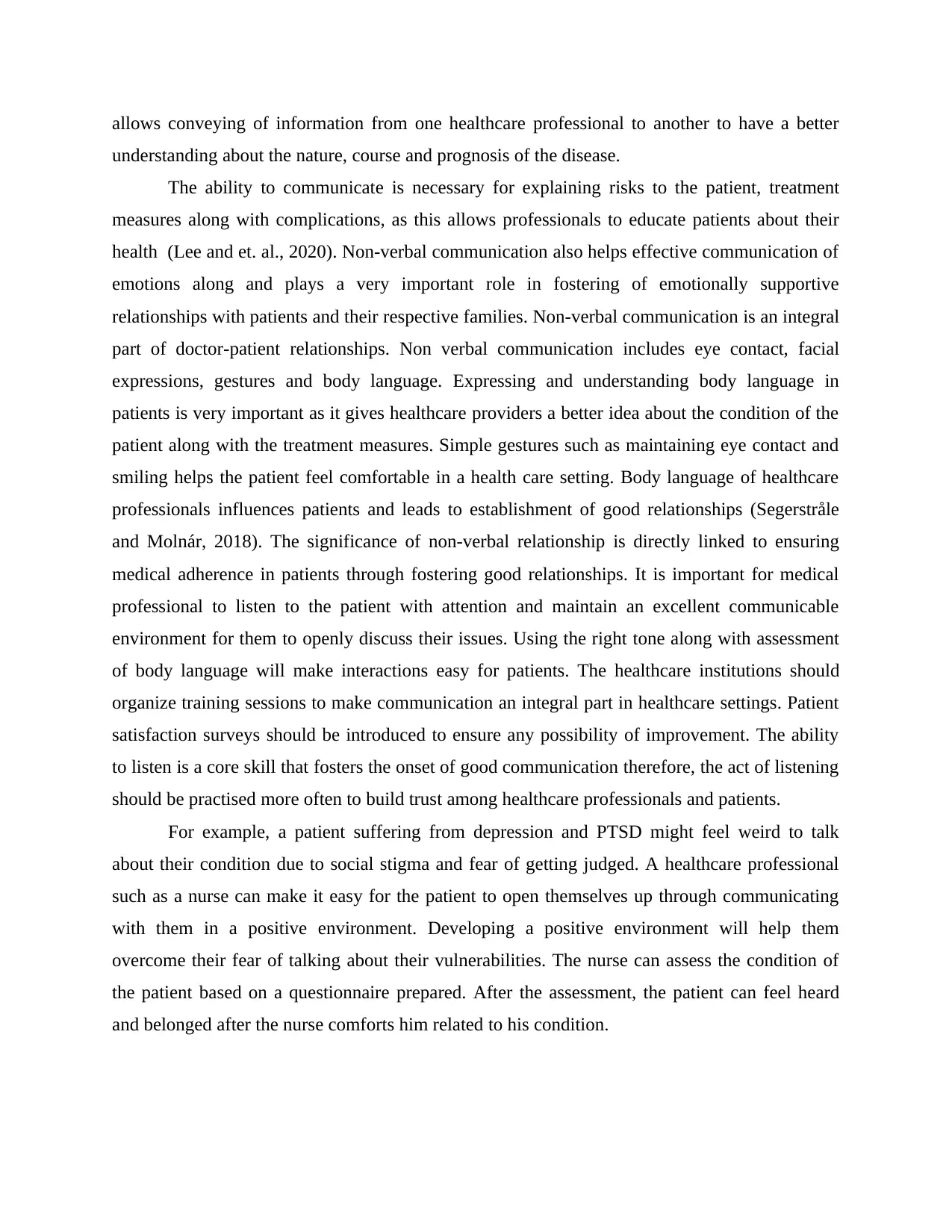
allows conveying of information from one healthcare professional to another to have a better
understanding about the nature, course and prognosis of the disease.
The ability to communicate is necessary for explaining risks to the patient, treatment
measures along with complications, as this allows professionals to educate patients about their
health (Lee and et. al., 2020). Non-verbal communication also helps effective communication of
emotions along and plays a very important role in fostering of emotionally supportive
relationships with patients and their respective families. Non-verbal communication is an integral
part of doctor-patient relationships. Non verbal communication includes eye contact, facial
expressions, gestures and body language. Expressing and understanding body language in
patients is very important as it gives healthcare providers a better idea about the condition of the
patient along with the treatment measures. Simple gestures such as maintaining eye contact and
smiling helps the patient feel comfortable in a health care setting. Body language of healthcare
professionals influences patients and leads to establishment of good relationships (Segerstråle
and Molnár, 2018). The significance of non-verbal relationship is directly linked to ensuring
medical adherence in patients through fostering good relationships. It is important for medical
professional to listen to the patient with attention and maintain an excellent communicable
environment for them to openly discuss their issues. Using the right tone along with assessment
of body language will make interactions easy for patients. The healthcare institutions should
organize training sessions to make communication an integral part in healthcare settings. Patient
satisfaction surveys should be introduced to ensure any possibility of improvement. The ability
to listen is a core skill that fosters the onset of good communication therefore, the act of listening
should be practised more often to build trust among healthcare professionals and patients.
For example, a patient suffering from depression and PTSD might feel weird to talk
about their condition due to social stigma and fear of getting judged. A healthcare professional
such as a nurse can make it easy for the patient to open themselves up through communicating
with them in a positive environment. Developing a positive environment will help them
overcome their fear of talking about their vulnerabilities. The nurse can assess the condition of
the patient based on a questionnaire prepared. After the assessment, the patient can feel heard
and belonged after the nurse comforts him related to his condition.
understanding about the nature, course and prognosis of the disease.
The ability to communicate is necessary for explaining risks to the patient, treatment
measures along with complications, as this allows professionals to educate patients about their
health (Lee and et. al., 2020). Non-verbal communication also helps effective communication of
emotions along and plays a very important role in fostering of emotionally supportive
relationships with patients and their respective families. Non-verbal communication is an integral
part of doctor-patient relationships. Non verbal communication includes eye contact, facial
expressions, gestures and body language. Expressing and understanding body language in
patients is very important as it gives healthcare providers a better idea about the condition of the
patient along with the treatment measures. Simple gestures such as maintaining eye contact and
smiling helps the patient feel comfortable in a health care setting. Body language of healthcare
professionals influences patients and leads to establishment of good relationships (Segerstråle
and Molnár, 2018). The significance of non-verbal relationship is directly linked to ensuring
medical adherence in patients through fostering good relationships. It is important for medical
professional to listen to the patient with attention and maintain an excellent communicable
environment for them to openly discuss their issues. Using the right tone along with assessment
of body language will make interactions easy for patients. The healthcare institutions should
organize training sessions to make communication an integral part in healthcare settings. Patient
satisfaction surveys should be introduced to ensure any possibility of improvement. The ability
to listen is a core skill that fosters the onset of good communication therefore, the act of listening
should be practised more often to build trust among healthcare professionals and patients.
For example, a patient suffering from depression and PTSD might feel weird to talk
about their condition due to social stigma and fear of getting judged. A healthcare professional
such as a nurse can make it easy for the patient to open themselves up through communicating
with them in a positive environment. Developing a positive environment will help them
overcome their fear of talking about their vulnerabilities. The nurse can assess the condition of
the patient based on a questionnaire prepared. After the assessment, the patient can feel heard
and belonged after the nurse comforts him related to his condition.
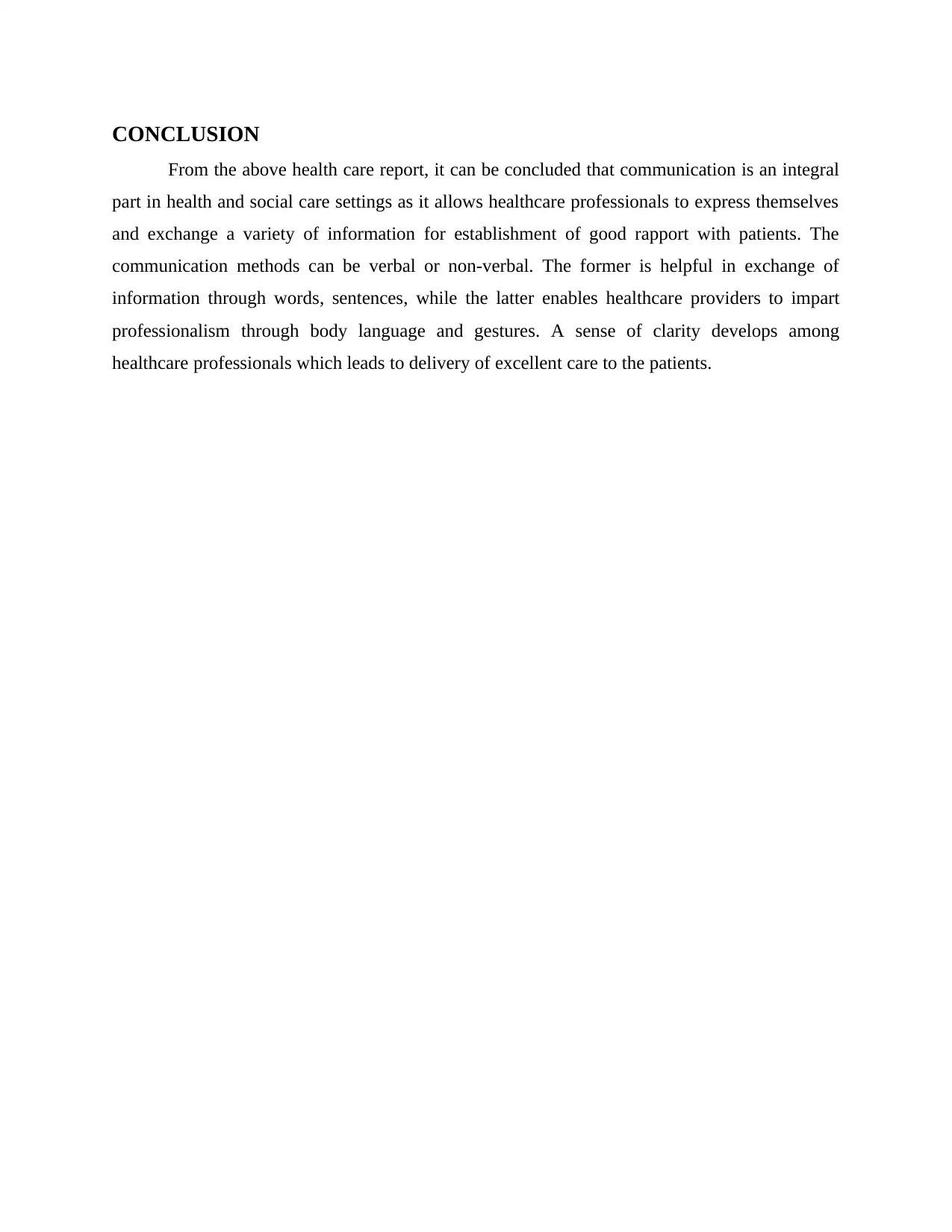
CONCLUSION
From the above health care report, it can be concluded that communication is an integral
part in health and social care settings as it allows healthcare professionals to express themselves
and exchange a variety of information for establishment of good rapport with patients. The
communication methods can be verbal or non-verbal. The former is helpful in exchange of
information through words, sentences, while the latter enables healthcare providers to impart
professionalism through body language and gestures. A sense of clarity develops among
healthcare professionals which leads to delivery of excellent care to the patients.
From the above health care report, it can be concluded that communication is an integral
part in health and social care settings as it allows healthcare professionals to express themselves
and exchange a variety of information for establishment of good rapport with patients. The
communication methods can be verbal or non-verbal. The former is helpful in exchange of
information through words, sentences, while the latter enables healthcare providers to impart
professionalism through body language and gestures. A sense of clarity develops among
healthcare professionals which leads to delivery of excellent care to the patients.
⊘ This is a preview!⊘
Do you want full access?
Subscribe today to unlock all pages.

Trusted by 1+ million students worldwide
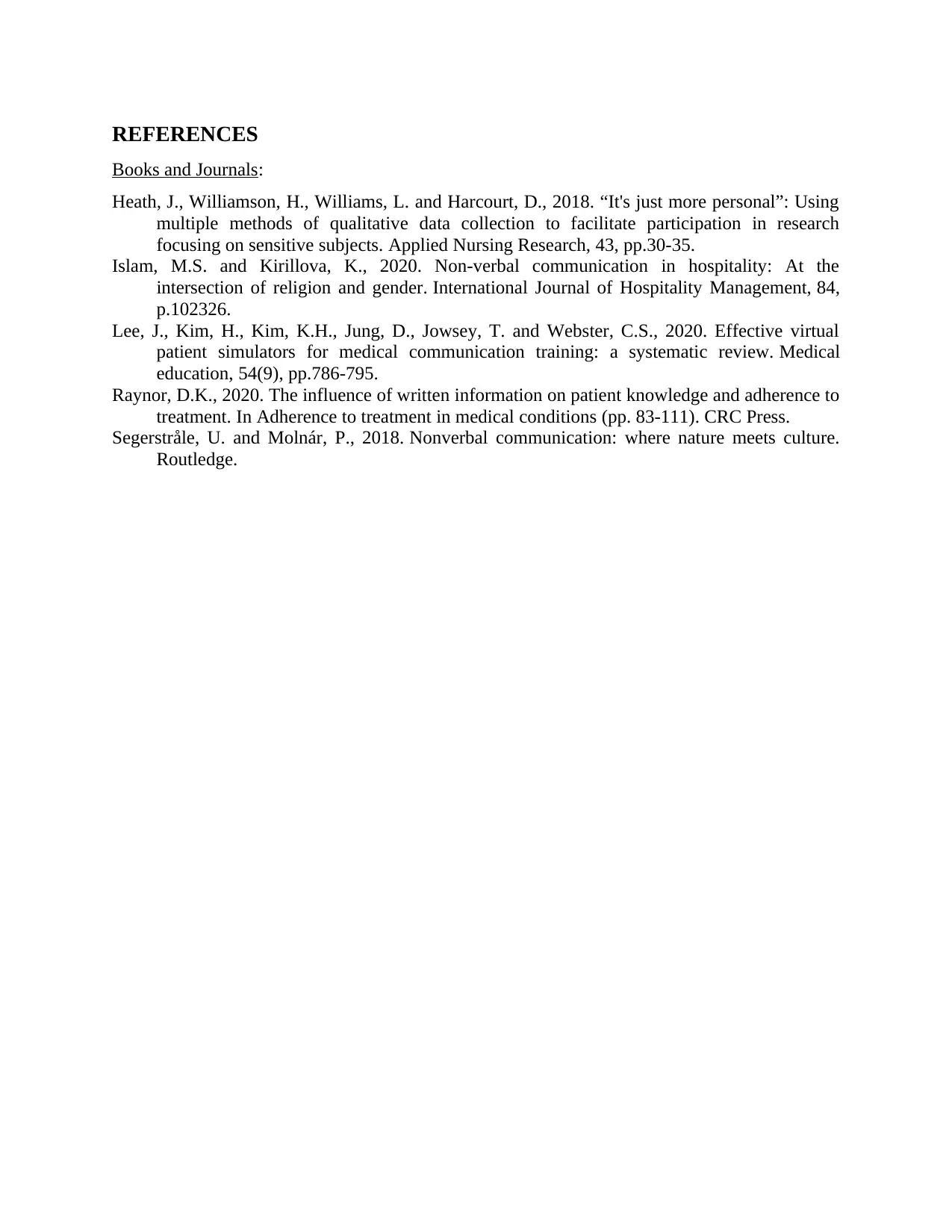
REFERENCES
Books and Journals:
Heath, J., Williamson, H., Williams, L. and Harcourt, D., 2018. “It's just more personal”: Using
multiple methods of qualitative data collection to facilitate participation in research
focusing on sensitive subjects. Applied Nursing Research, 43, pp.30-35.
Islam, M.S. and Kirillova, K., 2020. Non-verbal communication in hospitality: At the
intersection of religion and gender. International Journal of Hospitality Management, 84,
p.102326.
Lee, J., Kim, H., Kim, K.H., Jung, D., Jowsey, T. and Webster, C.S., 2020. Effective virtual
patient simulators for medical communication training: a systematic review. Medical
education, 54(9), pp.786-795.
Raynor, D.K., 2020. The influence of written information on patient knowledge and adherence to
treatment. In Adherence to treatment in medical conditions (pp. 83-111). CRC Press.
Segerstråle, U. and Molnár, P., 2018. Nonverbal communication: where nature meets culture.
Routledge.
Books and Journals:
Heath, J., Williamson, H., Williams, L. and Harcourt, D., 2018. “It's just more personal”: Using
multiple methods of qualitative data collection to facilitate participation in research
focusing on sensitive subjects. Applied Nursing Research, 43, pp.30-35.
Islam, M.S. and Kirillova, K., 2020. Non-verbal communication in hospitality: At the
intersection of religion and gender. International Journal of Hospitality Management, 84,
p.102326.
Lee, J., Kim, H., Kim, K.H., Jung, D., Jowsey, T. and Webster, C.S., 2020. Effective virtual
patient simulators for medical communication training: a systematic review. Medical
education, 54(9), pp.786-795.
Raynor, D.K., 2020. The influence of written information on patient knowledge and adherence to
treatment. In Adherence to treatment in medical conditions (pp. 83-111). CRC Press.
Segerstråle, U. and Molnár, P., 2018. Nonverbal communication: where nature meets culture.
Routledge.
1 out of 7
Related Documents
Your All-in-One AI-Powered Toolkit for Academic Success.
+13062052269
info@desklib.com
Available 24*7 on WhatsApp / Email
![[object Object]](/_next/static/media/star-bottom.7253800d.svg)
Unlock your academic potential
Copyright © 2020–2026 A2Z Services. All Rights Reserved. Developed and managed by ZUCOL.





